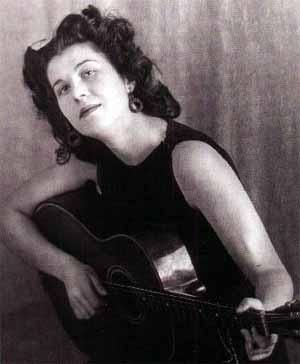Anna Marly

Anna Bétoulinksy was born in Saint Petersburg on 30 October, at the time of the very 1917 Revolution in which her father was shot to death. She left Russia for France at the beginning of the 1920's. As a refugee living in the Russian community of Menton with her mother, her elder sister and their loyal nanny, she endured some difficult, but happy years. At the age of 13 she was given a guitar. She never parted with this gift, which was to completely change the course of her life. "This was when I discovered the magic of sounds influenced by Charles Trénet." In 1934, she returned to Paris and began an artistic career under the pseudonym Anna Marly - she chose the surname out of the phone book. She began working as a dancer at the Ballets russes, and toured Europe with the company before joining the Ballets Wronska as their principal dancer.
But Anna didn't forget about her music. After some time spent working on her voice in the Paris conseratory, she began putting on her own shows in 1935. With her guitar and her own repertory, she performed at Shéhérazade, the Parisian cabaret club for gilded youth, then at the théâtre des Variétés in Brussels, and the Savoy Club in La Hague. During her stay in Holland, she met her future husband, the Baron van Doorn. The same year, Anna had a major professional success when she became the youngest ever member of SACEM (Société des Auteurs Compositeurs et des Editeurs de Musique). On 13th June 1940, Paris was declared an open city. Anna and her husband left the capital and went into exile. After travelling through Spain and Portugal, they settled in London in 1941, where Anna volunteered at the cafeteria for the Forces Françaises Libres (the Free French). She sang in the café sometimes. Soon she separated from her husband and became a projectionist, before getting involved in the théâtre "aux Armées" and singing on the BBC programme "Les Français parlent aux Français".
Anna Marly's most famous songs, including "Le Chant des partisans", date from this time. One day, towards the end of 1942, after having read an account of the Battle of Smolensk in the British papers, her Russian spirit was riled. One word came to her mind: "partisans". "I'm so confused, I pick up my guitar and play a rhythmic melody, and these Russian verses come pouring out from my heart: We will go there where the crow does not fly/And where the beast cannot go. No amount of strength and nobody/will make us turn back." Originally entitled, "La Marche des Partisans," this song was performed in Russian by its author until Joseph Kessel heard it for the first time and cried, "That's what France needs!" then wrote a French version with his nephew, Maurice Druon. After a whistled version was made the theme song of the BBC's "Honneur et Patrie," and then a way to recognize comrades in the maquis, "Le Chant des Partisans" (or "Guerilla Song," in English) quickly became the unofficial hymn of the Resistance.
She wrote "La Complainte du partisan" (The Partisan's Lament) at around the same time. "I was thinking about occupied France, and I began to play a sad, sad melody, without words." Emmanuel d'Astier de la Vigerie, the chief of the Libération-Sud movement, wrote the words to this song. Later, Joan Baez and Leonard Cohen recorded it. When she returned to France in 1945, Anna Marly was famous. Yet she moved to South America, where she became the ambassador of French chanson. In 1947 in Brazil she met her second husband, a Russian by the name of Yuri Smiernow. She continued to travel extensively, and crossed Africa accompanied by her guitar. These days, she lives in the US, where she writes stories and poems interwoven with memories. She hopes that her current work, like her recently published memoirs (Anna Marly, Troubadour de la Résistance. Tallandier-Historia), will serve as a testament to younger generations and all those who did not experience these tormented times in history, so that they, in turn, might carry and pass on the flame of memory.
Anna Marly, about whom General de Gaulle wrote "she made her talent into a weapon for France" and who was nicknamed the "Troubadour de la Résistance," wrote more than 300 songs, amongst them "Une chanson à trois temps," for Edith Piaf. Some of them have become part of our national heritage, a fact proven by the compulsory teaching of the "Chant des partisans" alongside the "Marseillaise" and the "Chant du départ" in schools during the 1960's. Written in the context of the war, Anna Marly's songs bear living witness to the history of France: for this reason, she was awarded the ordre national du Mérite in 1965 and the ordre national de la Légion d'honneur in 1985. She took part in an homage to Jean Moulin in 2000, on the 40th anniversary of 18th June 1960. During the ceremony, she sang the Chant des partisans with the French army choir. Anna Marly died in Alaska on 17th February 2006, at the age of 88.

